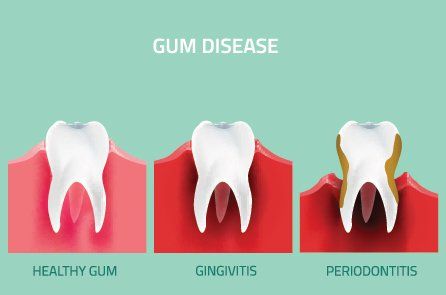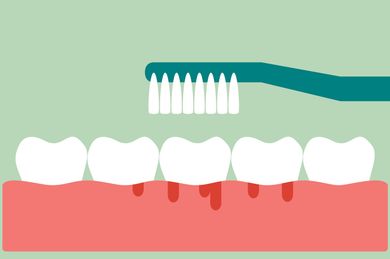Gum Disease
Gum Disease
Gum disease (periodontal disease) is an infection of the tissue surrounding the teeth known as the periodontium. In the early stages of infection — gingivitis — the gums become red, puffy, and bleed easily when brushing or flossing. Eventually, however, the gums will recede from the teeth, bone density will deplete, and teeth will begin to loosen and fall out. But gum disease isn’t just bad for your teeth. It can have a serious effect on your overall health, increasing your risk of cardiovascular disease, Alzheimer’s, and diabetes.
Dr. Vikas Bhasin
is serious about protecting not just your teeth and gums, but your whole body. If you’re concerned about gum disease, please call (02) 4655-3705
or email reception@camdendental.com.au
today for an appointment.
What Causes Gum Disease?
Infections of all kinds are caused by bacteria, viruses, and fungi entering a place where they don’t belong. In the case of gum disease, the problem bacteria aren’t invaders at all — they’re already present within the mouth. Although many different bacterial strains involved with gum disease have been catalogued, Prophyromonas gingivalis and Aggregatibacter actinomycetemcomitans are often the ones that are talked about. These bacteria are usually present in the mouth, but when their population grows out of control, it can cause disease.
Gum Disease Symptoms
Advanced gum disease doesn’t happen overnight. You mouth (and body!) give plenty of signs before it’s too late, which is why getting a checkup and cleaning every six months is so important. If you’re experiencing any of the gum disease symptoms listed below, which begin as minor symptoms (gingivitis) and conclude with the more severe (periodontal disease), it’s advised that schedule an appointment.
If you’re experiencing any of these symptoms, your dentist can better assess the stage of your gum disease, and offer the relevant treatment, with an appointment. It’s important to know that once your gums have begun to pull away from teeth, bacteria can more easily occupy those newly-formed pockets, expediting the process of tooth decay.
A Dangerous Chronic Infection
Gum disease might seem like it’s just an oral disease, but it’s not. Gum disease can impact your health in many ways. Bacteria can spread from your gums throughout the body, causing infections elsewhere. In addition, the inflammation caused by chronic infection is bad for your health, and can impact your health by potentially increasing the risk for conditions like Alzheimer’s disease and cancer. In addition, gum disease bacteria can “corrupt” your immune system, leading to autoimmune disease and making it hard for your body to fight other health conditions.
Gum Disease Treatment
If you have gum disease, Dr. Vikas Bhasin
can work with you to treat it according to the stage of the disease. For minor cases, a deep cleaning of the gum tissue combined with a bacteria wash combined with changes to your oral hygiene habits may be enough. If symptoms have become more advanced, they may require treatments like LANAP, a technological advancement which allows your dentist to use lasers to fully clean your gums.
If you would like to learn more about gum disease treatments, including options like LANAP, please call
(02) 4655-3705
or email reception@camdendental.com.au
today for an appointment.
Office Hours
Monday: 8 am - 5:30 pm
Tuesday: 8:30 am - 7 pm
Wednesday: 8:30 am - 7 pm
Thursday: 8:30 am - 5:30 pm
Friday: 8:30 am - 5 pm
Saturday: 8 am - 12 pm
Sunday: Closed
COPYRIGHT © 2020 SYDNEY LASER GUM CENTRE | SITEMAP | WEBSITE BY
PRO IMPRESSIONS MARKETING GROUP



